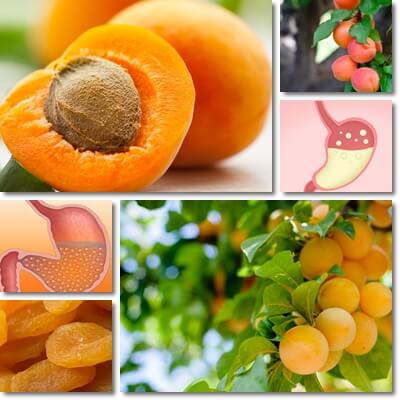Apricots are one of the foods that are considered good to eat for acid reflux. But do apricots actually help acid reflux such as fight heartburn, calm stomach acid regurgitation and soothe the stomach upset? To say a food is good for acid reflux may mean it helps calm acid reflux symptoms, but it may also mean it simply doesn’t trigger any symptoms. This begs the question: are apricots good for acid reflux because they help with symptoms, or are they good because they are not a trigger food? And just how safe are apricots for acid reflux and GERD?
Are fruit good for acid reflux?
There are fruit that cause acid reflux, such as citrus fruit, and fruit that don’t cause acid reflux. Does that mean that some fruit are good for acid reflux? Not necessarily. Just because a food is okay to eat with a certain condition, that doesn’t mean it’s specifically good for said condition in the sense that it provides benefits that contribute to the treatment of the condition.

That is, if you have acid reflux disease and are eating fruit all the time and not getting any symptoms, it doesn’t necessarily mean the fruit are actively helping your condition.
It might mean that you are tolerating the fruit well, even with the acid reflux, which is a sign you are eating fruit that don’t cause acid reflux and have an overall good GERD diet. It might also mean that you have acid reflux with no symptoms, also called silent reflux.
What is acid reflux?
By definition, acid reflux is a symptom of a condition called acid reflux disease or gastroesophageal reflux disease (GERD). People with 2-3 episodes of acid reflux per week are typically diagnosed with acid reflux disease. The condition itself presents with many symptoms, the most telling of which is acid reflux.
What is acid reflux like? Acid reflux is the reflux or backflow of stomach juices (gastric acid) and possibly also food particles. What happens is stomach juices escape the stomach and rise up into the esophagus, sometimes as high up as the mouth. When this happens, a burning feeling in the chest area, also known as heartburn, is experienced.
What causes acid reflux?
Acid reflux causes are varied and may include physical abnormalities such as a hiatal hernia, choice of food (some foods just cause excess acidity and trigger acid reflux), medication (antibiotics, anti-inflammatory medication and any type of medication taken long-term, except for antacids and proton-pump inhibitors) and lifestyle factors such as overeating, lying down soon after eating or eating close to bedtime.
Most of the time, it’s a combination of factors that causes the condition. Once the condition is established, a person becomes more sensitive to triggers such as different foods, more so than people without the condition.
Symptoms of acid reflux
Symptoms of acid reflux may be typical such as regurgitation of stomach juices, heartburn, excessive burping, hiccups, bloating, a bad taste in the mouth from the acidic stomach juices and bad breath.
Other symptoms of acid reflux are atypical such as a sore throat, a sore tongue or hoarseness caused by damage produced by regurgitating acidic stomach juices, but also a tingling sensation in the back of the throat brought on by the escape of stomach juices into the esophagus, a dry cough triggered by the tingling sensation (also known as an acid reflux cough), laryngospasms (a larynx spasm that causes the closing of the airways for a few seconds to up to a minute) and a lump in throat sensation.

What to eat for acid reflux?
Some foods are just good to eat with acid reflux and some foods are just bad to eat with acid reflux. The best foods to eat for acid reflux are foods that are blander (that is, not heavily seasoned, too spicy, too fatty), easier to digest and overall easier on the stomach.
Fresh fruits such as blueberries, raspberries, blackberries, cherries, apricots, peaches, pears, quinces etc. don’t tend to elicit any symptoms if consumed reasonably. Fresh, unfermented cheeses and dairy milk, raw nuts and seeds, even dried fruits, eggs, light fish and unprocessed meat are all okay to eat with acid reflux disease so long as they are consumed reasonably.
A good acid reflux diet is a clean diet consisting of foods as close to their natural state as possible. See my list of foods to eat and to avoid for acid reflux.
Apricots and acid reflux
Apricots don’t really do anything for acid reflux. While they aren’t bad for acid reflux, they aren’t necessarily good either in the sense that they don’t actively help with acid reflux.
When they’re saying that apricots are good for acid reflux, what most people actually mean is that they aren’t bad for the condition and don’t elicit symptoms or cause flareups. Which makes them good to eat or better said, safe to eat.
A diet consisting of predominantly safe foods is good for acid reflux and can help reduce symptoms and even stop them altogether, contributing to the treatment of the condition. So yes, apricots are good for acid reflux because they aren’t a trigger food, but they don’t provide any benefits specifically for the treatment of the condition either.
Why are apricots good for acid reflux?
Fresh apricots are mostly water and have a decent, but not excessive content of dietary fiber (2 g of fiber/100 g of fruit). They contain pectin, a type of dietary fiber that is mucilaginous in nature and has a soothing, non-irritating effect on the digestive system. Just as important, apricots are low in organic acids, hence their predominantly sweet taste (they’re not sharp or sour at all), and extremely low-fat.
All of these elements combined make apricots easy and quick to digest and easy on the stomach, an almost ideal food to eat for acid reflux disease.
The fruit is generally well tolerated in acid reflux disease and doesn’t typically elicit symptoms of digestive upset. This is why fresh apricots are regarded as a good food to eat for acid reflux, in moderation of course.
See also: Is Turmeric Good For Acid Reflux?
Dried apricots and acid reflux
Dried apricots are also a fairly good choice of a food to eat with acid reflux disease. Dried apricots aren’t typically a trigger food in acid reflux, but some people may experience digestive upset and other side effects if they eat sulfured dried apricots.
Sulfur dioxide is commonly used as a preservative in dried fruit, to prevent spoilage and improve color, but is also a common allergen and known for causing symptoms of food intolerance, including digestive side effects, but also asthma and anaphylactic shock.
In the amounts they are meant to be consumed, dried apricots shouldn’t elicit significant digestive side effects in someone without sulfite sensitivity or intolerance or sulfites allergy, but if your acid reflux is acting up, you can switch to unsulfured dried apricots to see if there are any improvements.
How to tell apart sulfured vs unsulfured dried apricots
The difference between sulfured and unsulfured dried apricots is that sulfured dried apricots are bright golden yellow-orange, vs unsulfured dried apricots which are typically brown. It’s a good idea to also read the label to make sure your choice of product is sulfite-free.
Are apricots acidic?
Acidic foods in general are bad for acid reflux disease. Whether it’s openly acidic foods such as lemons, lime, oranges and other citrus fruits and citrus fruit juices, vinegar, pickles, soured milk or fermented yogurts, tomatoes, tomato juice and sauce, or less openly acidic food options such as alcohol, coffee, fried and processed foods. But apricots are not acidic. You can tell this by their taste. Their sweet taste, not sour or sharp, is an indication of a naturally low content of organic acids in the fruit and recommends them for consumption in acid reflux.
